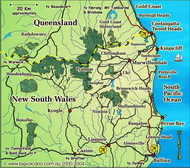Burringbar, 2483, Crabbes Creek, Mooball, and Stokers Siding, 2484
Rail Trail Villages
by Jo-Ann Palmer.
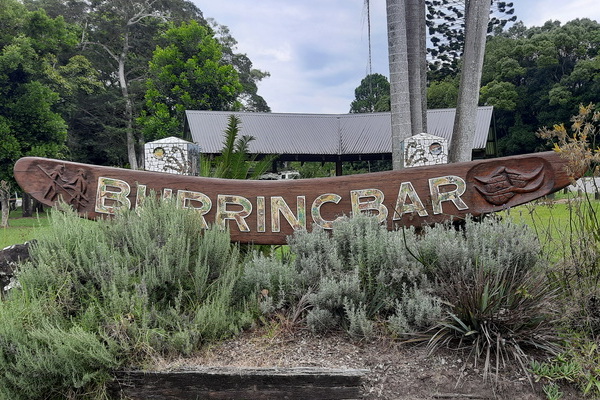
Photos: Burringbar, Crabbes Creek, Mooball and Stokers Siding by J Palmer, Big Volcano Tourism
Like a string of pearls on a necklace, the Tweed Valley Way villages of Burringbar, Crabbes Creek, Mooball, and Stokers Siding, were settled in the mid 1800s.
First by timber getters and dairy farmers, they were soon followed by sugar cane growers, and producers growing vegetables and tropical fruits, which thrived in the rich flood plain soils.
Selling mostly to the accesible nearby towns of Murwillumbah, Brunswick Heads and Byron Bay, the fortunes of local farmers and the villages improved considerably after lobbying by local politicians and business interests resulted in the completion of the Lismore to Murwillumbah rail line in 1894, and creation of rail stations at Murwillumbah, Dunbible, Stokers Siding and Crabbes Creek.
Mooball would come later, with NSW State Archive documents showing "station arrangements" for Mooball, with the name crossed out and replaced by Crabbes Creek.
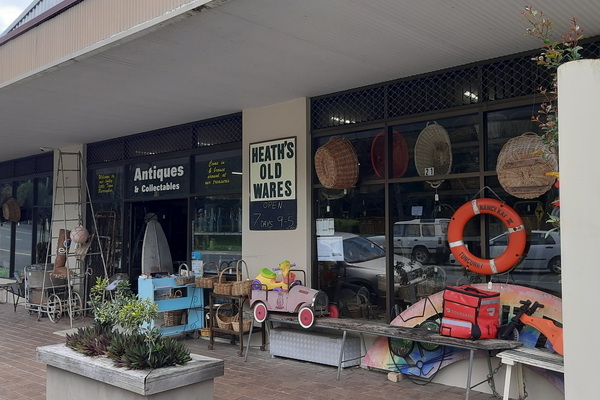
In the early 1900s, Burringbar was the centre of a bustling timber industry.
Timber getters felled the "red gold" of Australian Red Cedar, and other sought after native species like Silky Oak, Hoop Pine, White beech and Rosewood, and hauled the massive logs out of the rainforest slopes with the help of bullock teams.
Taken to Stokers Siding, the timber was loaded onto trains and transported to Byron Bay for transfer to steamships bound for Sydney and Brisbane, prior to the mid centrury rail line completion in 1934.
Like many other villages scattered along the Tweed River and its tributaries, after the cedar-getters and timber fellers cleared the land, the dairy farmers moved in, with many farmers producing milk and butter for local towns in the region.
Crabbes Creek was also heavily reliant on the timber industry. The village became a hub for logging and milling operations, and many of the locals worked in the sawmills, supplied from the forested hills around, and the "Cudgen Scrub", cleared primarily by South Sea Islanders who were "blackbirded" slave labour.
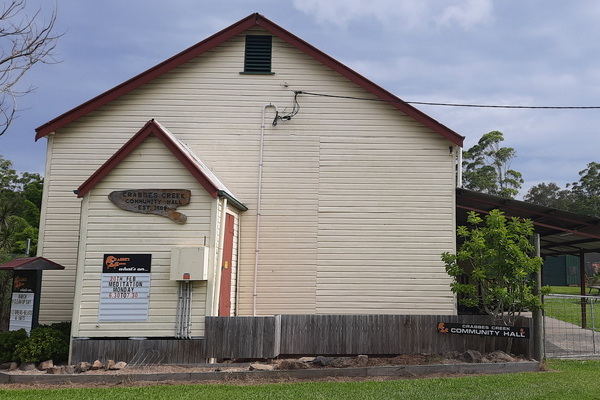
Mooball was centered around the sugar cane industry. The village had several sugar mills that processed the cane, and many of the locals were employed in the industry.
In addition to sugar cane, farmers in the area also grew bananas, pawpaws, and other tropical fruits, with their packing boxes supplied from local sawmills.
Stokers Siding also had a strong farming community, with many farmers growing crops such as maize, potatoes, and pumpkins.
Stokers became a vital communications and transport link between the Northern Rivers region and the rest of the state, when trains pulled up for passengers from 1896.
And when a gantry crane was built at the railway station in 1905 for loading timber, it became the major rail hub for the district, with dairy, farm and other agricultural produce bound for nearby towns, and further afield, also able to be loaded there.
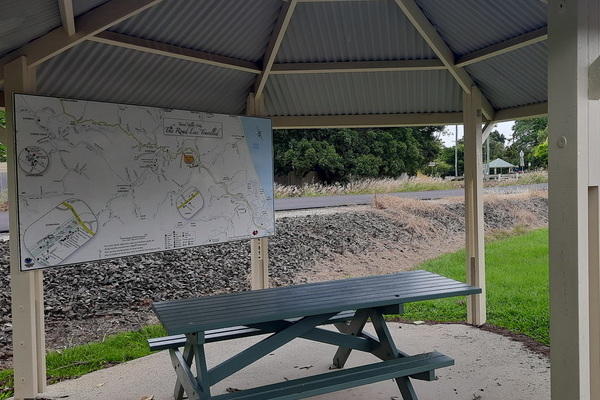
When the timber industry declined in the region, most of the mills and sawmills in the Tweed Valley closed down.
(Today, Uki Sawmill is the only sawmill remaining in the Tweed Valley; a legacy of an industry that brought many pioneering families to settle here.)
But one of the biggest changes that affected these villages came in the 1990s with the construction of the Pacific Highway bypass.
Businesses along the route had previously thrived as lunch and dinner stops, when freight drivers stopped for a bite to eat, and tourists bound for popular destinations like the Gold Coast, took the opportunity take a break and stretch their legs with a stoll along local shop fronts.
When the Murwillumbah bypass opening in 2002, the former Pacific Highway became the Tweed Valley Way, and through traffic plummented.
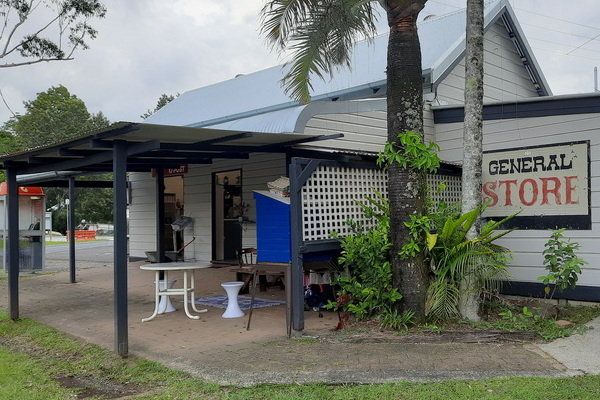
While the bypass was initially met with some resistance from locals fearing it would negatively impact their businesses, it has since been embraced as a positive development that generally improved safety and made the villages more accessible to visitors.
The villages also continue to thrive as agricultural centres, with many farms and food producers selling their products at local farmers markets and via online channels.
And the communities have also enjoyed a revival of the streetscapes, with "treechangers" opening new enterprises and revitalising local shop fronts, which are now taking advantage of the opening of the Northern Rivers Rail Trail, on 1st March 2023.
Accommodation in Rail Trail Villages and nearby
Big Volcano Supporters
Hint: Mouse over for external site description. External links open in a new window.
Accommodations listed and linked here are Big Volcano customers. Support local - Book direct!
Big Volcano Supporters
Accommodation Directory
More Accommodation
Disclosure: The selected links below are affiliate links. If you make a booking after clicking on one of these links, we receive a small commission at NO extra cost to you.
Book Direct via Booking.com or choose from the links below
- Sweetwater Cottage. A private mountain escape - Upper Burringbar
- Coastal Farm Retreat - Family Friendly - Crabbes Creek
- La Rocher Eco Retreat - Smiths Creek via Stokers Siding
- EcOasis Uki via Stokers Siding
- Big Volcano Accommodation Directory
Local Tours & Attractions
Hint: Mouse over for external site description. External links open in a new window.
Big Volcano Supporters
Activities and Attractions Directory
More Tours & Attractions
Burringbar-Mooball Feud
"Once upon a time in the Tweed Valley there were two sleepy hamlets and one pub...
In 1931 the pub (in Burringbar) burned down and the owner, Mr Jack Watterson, decided to rebuild on the main road in Mooball.
The people of Burringbar were very angry and started a petition to keep the pub in their town; funds were raised, barristers engaged and legal proceedings commenced.
Mr Watterson won the case and after an unsuccessful appeal by the Burringbar side the new Victory Hotel opened in Mooball in 1932.
Burringbar was outraged, claimed the case was fixed, boycotted the new pub and obtained a licence to serve beer in a room at the back of Alex Phillip's garage.
The community was split. Mooball withdrew all players from combined sporting teams, formed their own teams and when Burringbar met Mooball it was a clash with a vengeance.
Although the popular Burringbar policeman Sergeant Wilde was able to keep the peace some of the old timers never set foot in the pub.
As time healeth all things, 20 years later the two villages again combined to form a hockey club. Now 60 years later the pub story is part of local history, the houses have nearly joined between the villages and people are back on neighbourly terms.
See you in the bar!"
Condensed from the story originally published by Ron Johansen in Tales of our Times Volume 1, November 1992. Extract From TIMELINES—October 2012 p6 Copyright Murwillumbah Historical Society.
Burringbar
A thriving village once again, Burringbar offers a range of local services with Burringbar Bowls Club, "Club Burringbar", a hub for local sports and community events, while quirky retail businesses add to the somewhat bohemian vibe of this former timber town.
Go to Heaths Old Wares, a second hand and vintage goods warehouse, where your sure to discover "that thing" you've been looking for, for years. And if not, there will be something else!
Brooklyn Tasting Room is a boutique wine and craft beer tasting room (appointments preferred). Burringbar Gallery supports local arts and wares, and has an impressive array of antiques and collectables with an Asian focus, while "The Barn" general store, has just about everything you could need. They even offer fresh cuppas and cake!
Just up the road, Tweed Valley Whey sells gourmet cheeses which are produced on the farm. The premises comprises the cheese factory, an artisan produce shop, a gelato bar and licensed cafe.
Mooball
You can't miss Mooball (pron., "Mow-ball").
With distinctive black and white cow patterns painted on the power poles through this Tweed Valley Way village, the paintwork declares that you've arrived.
Popular with biker groups cruising on the weekend, bikes will usually be neatly parked up outside the Hotel Victory, or the MooMoo Roadhouse, which has a huge oversized motor bike parked outside.
It's also a popular stop for families, to "fuel up, grab a bite to eat, have some awesome coffee and check out the great motorcycles, and memorabila".
Mooball is also the Tweed Valley Way turn-off to the Tweed coast beachside communities of Pottsville Beach, Hastings Point and Wooyung.
Crabbes Creek
About to be "rediscovered" as a result of being the southern rail head for the Tweed section of the Northern Rivers Rail Trail, Crabbes Creek is a quiet village with an historical hall (previously a Macedonian Orthodox Church), a general store, and a public school.
The hall hosts weekly community events and regular functions like yoga and meditation classes, while on Thursday, Friday and Saturday, food vendors may rock up to give locals a night off from cooking dinner.
The general store offers a wide range of neccessities and not so neccessities, along with beverages and cakes. Look out for the historic "visible pump" on display next to the working petrol pumps.
The Nothern Rivers Rail Trail connects to the village via a pretty, winding hard surface path going under the Tweed Valley Way.
Stokers Siding
After ex TC Debbie flooded their Bray Park HQ in 2017, Community Print Makers found its new home in the historic 1921 building previously famous as Stokers Siding Pottery & Gallery, which was founded in 1977 by the late Bob Connery, and his partner Julie Rainow. The new life of the building is a fitting testament to their arts legacy for the Tweed.
The CPM workshop gallery is open to the public Friday to Sunday from 11am to 3pm.
A Post Office/General Store and refreshment room is located in the old railway station, with improvements to amenities planned to accommodate vistiors on the recently opened Northern Rivers Rail Trail.
The village also boasts a very well used historic community hall known as the Stokers Siding Dunbible Memorial Hall.
A hub for local events and functions, the hall is open for takeaway/dine in every Friday night, and "Fifteen Minutes of Fame” amateur talent night on the first Friday in February, May, August and November. Entry is $10 and the doors open 6.30pm, with meals served from 7pm, and the show starting at 7.30pm. A licensed bar is available at these events.
Accommodation
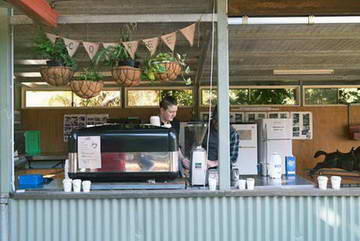 Hosanna Farm Stay Located just metres from the Northern Rivers Rail Trail in Stokers Siding, Hosanna is a 100-acre family and dog friendly farmstay offering affordable accommodation options including rustic timber cabins, A frame style tents, and a campground.
Hosanna Farm Stay Located just metres from the Northern Rivers Rail Trail in Stokers Siding, Hosanna is a 100-acre family and dog friendly farmstay offering affordable accommodation options including rustic timber cabins, A frame style tents, and a campground.
It's ideal for families and couples looking for a back to nature farm experience.
Facilities include communal amenities, a wood fired sauna next to the swimming and kayaking dam, playing spaces and equipment, BBQ and picnic area, Hosanna Cafe & Store, optional paid farm adventures, and more.
Tours & Attractions
The Northern Rivers Rail Trail provides a safe and car free way to explore the Rail Trail villages, with easy access and limited parking available at the villages stations. Bike hire is available from a number of providers operating out of Byron Bay and Murwillumbah.
For the more adventurous traveller, there's also bushwalking and bird watching opportunities in the parks and reserves of the region.
Outdoor enthusiasts here for the Northern Rivers Rail Trail, will find plenty of other reasons to stay in the area and enjoy the local atmosphere, including bushwalks along old logging roads in nearby Mooball National Park, or a hike to the increasingly popular (but still "secret"- shhhh...) Unicorn Falls section of the Northern Rivers Great Walk from Nightcap National Park to Uki.
All Trails Mooball Natonal Park page provides one of the more reliable reports on available bushwalks and hikes through Mooball National Park which was created in 1999, and was previously a state forest. It's also one of the few national parks in the Northern Rivers where horse riding is permitted. Unfortunately the park is officially closed for now, due to extensive 2022 flood damage, with most of the old logging roads and walking tracks either overgrown or in poor and hazardous condition.
Getting to the Rail Trail Villages
Getting to the region is easy: Visitors can reach Murwillumbah by road and rail, with air services available at Gold Coast Airport and Ballina /Byron Gateway Airport.
Road:
The Rail Trail villages are between 7 and 20 kilometres south of Murwillumbah, which is approximately 821 kilometres - about 11 hours drive north from Sydney, and approximately 132 kilometres - about 90 minutes drive south from Brisbane, via the Pacific Highway.
Air
Domestic flights operate from all capital cities to Gold Coast Airport at Coolangatta and Ballina/Byron Gateway Airport. A number of international carriers servicing SE Asia, New Zealand and the Pacific fly into Gold Coast Airport.
Daily airport transfer services between Ballina/Byron Gateway Airport and Gold Coast Airport, are available to selected localities in the region, with some shuttles also going to Brisbane International Airport. Visit Gold Coast Airport Transfer Services for more information.
Coach/Rail
4x weekly interstate coach services (Premier Motor Services) to Brisbane and Sydney setdown and pickup outside the Murwillumbah Station, South Murwillumbah, on the Tweed Valley Way, next to the Murwillumbah Visitor Information Centre, and Northern Rivers Rail Trail hub.
NSW TrainLink coaches set down and pick up for transfers to Casino, for the daily or overnight train between Sydney and Brisbane. See Transport NSW - Murwillumbah for departures, timetables and more information for all coach and train services.
Disclosure
Some of the links in this page may be affiliate links. If you use these links to make a purchase we will earn a small commission, at no additional cost to you. Please view our affilates disclosure here.
Readings and References
Caldera to the Sea. A History of the Tweed Valley, Joanne Boileau, pub. 2006
Historic Manuscript of the Tweed, by H.W. Denning, 1988. ISBN O 9596589 7 1
Murwillumbah Historical Society. Ron Johansen in Tales of our Times Volume 1, November 1992. Retreived Extract From TIMELINES—October 2012 p6
Rootsweb.com - The Macedonians revised 2018. Retreived 2022.
Stokers Siding & District Community Association Retreived 2022.
The Changing Valley, A collection of photographs of the Tweed Valley from 1886 to 1982,
complied by R. Sullivan, J Brady and History Students of Tweed River High School
The Echo - Vale Bob Connery retreived 18/03/2023
Tweed Shire Council Local Government Week Presentation,
Our Railway Heritage, Tina King, Urbis 01/08/19 retreived 25/07/2022.
Wikipedia.org Retreived 2022.
Photography: Jo-Ann Palmer, Fig Tree Retro Studio, Hosanna Farmstay
